Pendergast T., Pendergast S. St. James Encyclopedia of Popular Culture. Volume 1: A-D
Подождите немного. Документ загружается.


CLIFTENCYCLOPEDIA OF POPULAR CULTURE
529
sons (who were two, five, and six when he died) be born in Puerto
Rico. Unfortunately, this pride often was misconstrued—and argu-
ably, one reason why he was not beloved earlier on was racism. The
expectation that he blend in rather than exude ethnicity is epitomized
by the fact that on all of Clemente’s Topps baseball cards issued
between 1958 and 1969, his name is Americanized as ‘‘Bob’’ Clemente.
Adding to the affront was that whenever Clemente would
comment that other ballplayers of equal accomplishment were luxuri-
ating in the limelight, he would be labeled a complainer and hypo-
chondriac. ‘‘As a teammate,’’ fellow Pittsburgh Pirate Willie Stargell
observed, ‘‘we had a chance to marvel at talents a lot of people didn’t
understand.’’ So it was no surprise that after the 1971 World Series,
upon being handed the MVP trophy, Clemente pointedly declared, ‘‘I
want everybody in the world to know that this is the way I play all the
time. All season. Every season.’’ Then, ever so typically, he spoke in
Spanish, asking for his father’s blessing.
The rule requiring a ballplayer to be retired for five years prior to
earning Hall of Fame eligibility was waived for Clemente. He was
inducted a year after his death, becoming the first Hispanic to be so
honored. Since then, he has inspired thousands of Latino ballplayers.
‘‘Growing up in Puerto Rico, we got to learn a lot about his
character,’’ observed Bernie Williams, one of the major league stars
of the 1990s. ‘‘Clemente is a great hero for all Latin players,’’ added
Juan Gonzalez, a Williams peer and fellow Puerto Rican. ‘‘Not only
was he one of the best baseball players ever, but he was a great human
being as well.’’ Clemente also has been cherished by his teammates.
After pinch-hitting a game-winning ninth inning single in Game 2 of
1979 World Series, Pirate catcher Manny Sanguillen declared that he
wished his feat to be dedicated to the memory of Clemente. ‘‘He
helped us in a lot of ways,’’ summed up Willie Stargell, ‘‘to be the
players we were.’’
Clemente was the second ballplayer (after Jackie Robinson) to
be featured on a United States postage stamp. In 1973, the govern-
ment of the Commonwealth of Puerto Rico granted acreage for the
development of Roberto Clemente Sports City, which allows Puerto
Ricans to participate in a wide range of athletic pastimes. In 1993, his
eldest son, Roberto, Jr., established the Roberto Clemente Founda-
tion, which offers recreational and educational activities for Pitts-
burgh-area children while stressing the relevance of community
involvement. In 1994, the Pirates unveiled a statue of Clemente out-
side Three Rivers Stadium. Throughout 1998—the twenty-fifth anni-
versary of his death—the Baseball Hall of Fame issued a special Ro-
berto Clemente commemorative admission ticket. Each year, one major
leaguer receives the True Value/Roberto Clemente Man of the Year
Award for combining on-field heroics with community responsibility.
Roberto Clemente merits every honor he has received. In an era
of pampered, egocentric athletes who charge big bucks to little kids
for autographs, the manner in which Clemente lived and died is all the
more poignant and praiseworthy. As he once observed, ‘‘Any time
you have an opportunity to make things better and you don’t, then you
are wasting your time on this earth.’’
—Rob Edelman
F
URTHER READING:
Markusen, Bruce. Roberto Clemente: The Great One. Champaign,
Illinois, Sports Publishing, Inc., 1998.
Miller, Ira. Roberto Clemente. New York, Tempo Books, 1973.
Musick, Phil. Who Was Roberto? A Biography of Roberto Clemente.
Garden City, New York, Doubleday, 1974.
Wagenheim, Kal. Clemente! New York, Praeger Publishers, 1973.
Walker, Paul Robert. Pride of Puerto Rico: The Life of Roberto
Clemente. New York, Harcourt Brace Jovanovich, 1988.
Cleopatra
The story of Cleopatra has been a perennial favorite for the
Hollywood cinema. The most notorious version remains the 1963
epic starring Elizabeth Taylor and Richard Burton—a film whose box
office failure is credited with helping to destroy the Hollywood studio
system. Made for a then staggering 44 million dollars, the production
was fraught with setbacks and scandals, and film historian David
Cook noted that the ‘‘disastrous’’ four-hour film had not broken even,
some thirty-six years later. Received badly by both audiences and
critics, Cleopatra paled in comparison to the off-screen antics of its
stars. The cast’s real-life adultery, life-threatening illness, and the
grand passion between Taylor and Burton provoked the first major
paparazzi feeding frenzy of the 1960s.
—Jeannette Sloniowski
F
URTHER READING:
Brodsky, Jack, and Nathan Weiss. The Cleopatra Papers: A Private
Correspondence. New York, Simon and Schuster, 1963.
Cook, David. A History of Narrative Film. 2nd ed. New York, W.W.
Norton and Company, 1990.
Clift, Montgomery (1920-1966)
Four years older than Brando, eleven years senior to James
Dean, but finding stardom only just ahead of both, Montgomery Clift
is invariably bracketed with them—the leader of the great trio of the
beautiful and doomed who emerged from the Actors Studio in New
York City to transform the postwar face of screen acting with their
individual and collective intensity. He died too soon to recover from
his failures and too late to become a mythic icon like Dean or Marilyn
Monroe, but to examine his all-too-short filmography is to be remind-
ed of his achievements that have been all too often buried beneath the
rubble of his ruined life.
Only cast in serious dramas, the fragile and gifted Clift, frequent-
ly quivering with painful introspection, was the screen’s great outsid-
er, misfit, or victim during the 1950s—the ultimately rejected fortune
hunter of The Heiress (1949); driven by despair to murder and by
murder to guilt in A Place in the Sun (1951), his first film with
Elizabeth Taylor; beaten and humiliated for his refusal to fight in the
boxing ring as Prewitt in From Here to Eternity (1953); a priest
tormented by the secrets of the confessional in Hitchcock’s I Confess
(1953); the columnist unable to cope with the pain of the lovelorn in
Lonelyhearts (1959); a victim of the Nazi concentration camps in
Judgment at Nuremberg (1961); and last, but far from least, one of
John Huston’s Misfits (1961), corralling wild horses with Clark Gable
and Marilyn Monroe.
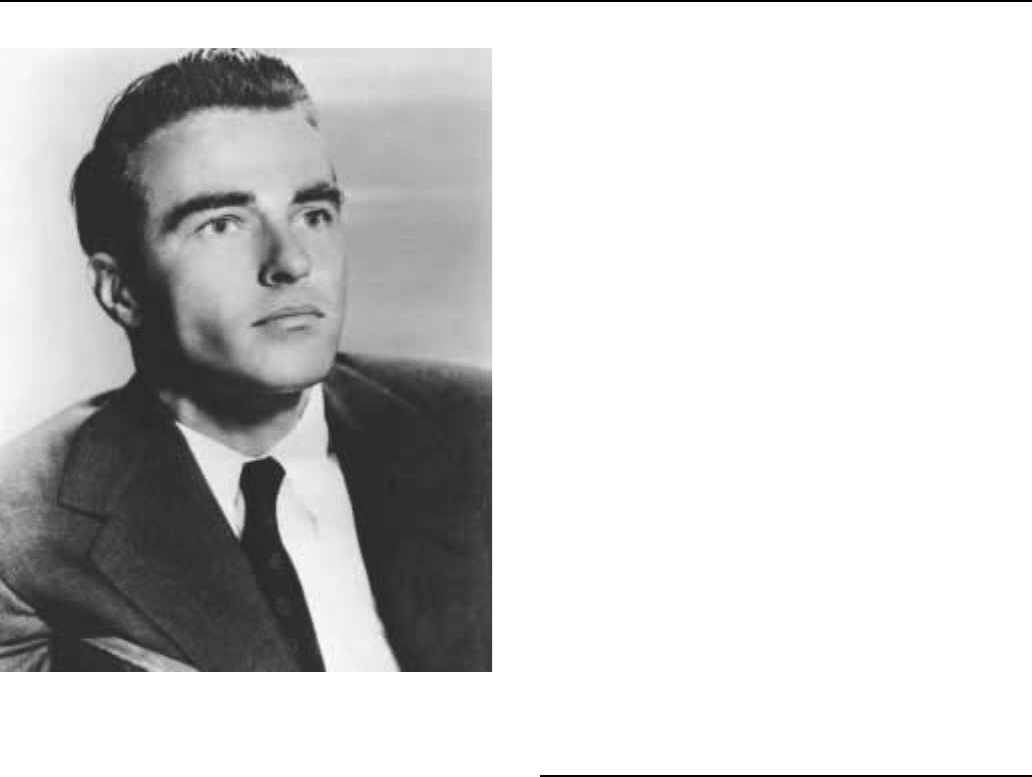
CLINE ENCYCLOPEDIA OF POPULAR CULTURE
530
Montgomery Clift
Born Edward Montgomery Clift in Omaha, Nebraska, the twin
brother of a sister and the son of a neurotic, social-climbing and
dangerously possessive mother, Clift was taken traveling in Europe
from an early age. He acquired polish, manners, and the right
acquaintance with art and literature. Precocious and sophisticated, he
began acting at age fourteen and was on Broadway a year later. His
rise was rapid, his connections influential, and by the time he
appeared in two Thornton Wilder plays, The Skin of Our Teeth and
Our Town, he was destined for theater stardom. Encouraged by Elia
Kazan, he became a founding student of the Actors Studio in 1947 but
soon succumbed to Hollywood, which had been courting him for
some time.
Clift’s first film was Howard Hawks’s Red River (1948), which
cast him as a cowboy, pitting his almost girlish persona against John
Wayne, whose adopted son he played. The film was, however, not
released until after Clift’s next, The Search (1948) for Fred Zinnemann,
which gained him the first of his four Oscar nominations for his
sensitive performance as a soldier helping a stateless orphan in war-
torn Germany find his missing mother. When Red River came out
Clift became a star, the darling of the fan magazines and the adoring
young girls of America.
But Clift, anguished by his homosexuality and increasingly
addicted to drugs and alcohol, was an unhappy man with a disastrous
private life that he strove to keep secret. In 1956, after a party given by
his most devoted friend, Elizabeth Taylor, the actor was involved in a
car crash. His severe injuries included the severing of nerves that
rendered the left side of his face immobile, effectively destroying the
perfection of his fine beauty. He was filming Raintree County (1957)
with Taylor at the time and, despite director Edward Dmytryk’s
efforts to photograph him in such a way as to avoid exposing the
extent of the damage, both Clift and the film remained inert.
Driven ever further into self-destruction and loss of control, the
actor did well to emerge with credit from Judgment at Nuremberg and
The Misfits, but he was disastrously cast as Freud (1962), John
Huston’s altogether misguided biopic about the analyst, during the
making of which Clift, whose staring eyes had become a too-
prominent feature of his on-screen face, underwent a double cataract
operation. After Freud, Clift’s mainstream career was over. He had
been overshadowed by his nemesis, Brando, in The Young Lions
(1958) and was of little account in the overwrought Suddenly Last
Summer (1959) with Taylor and Katharine Hepburn. He dragged
himself out of the murky private world into which he had descended
to play one last loner in a French film, L’Espion (The Defector) in
1966, before dying of a heart attack at the age of forty-five.
—Robyn Karney
F
URTHER READING:
Bosworth, Patricia. Montgomery Clift: A Biography. New York,
Harcourt, Brace, Jovanovich, 1978.
Hoskyns, Barney. Montgomery Clift, Beautiful Loser. London,
Bloomsbury Publishing, 1991.
Kalfatovic, Mary C. Montgomery Clift: A Bio-Bibliography. Con-
necticut, Greenwood Publishing, 1994.
Thomson, David. A Biographical Dictionary of Film. New York,
Alfred A. Knopf, 1994.
Cline, Patsy (1932-1963)
Known for her smooth, powerful delivery, Patsy Cline became
the first successful crossover female country vocalist with hits in the
pop market during the early 1960s. Cline was an aggressive artist who
fought against efforts to mold her into a pop sensation. She initially
disliked many of the songs that became her biggest hits, preferring up-
tempo country tunes to the more accessible ballads that made her
famous. As her relatively brief career came to an end in 1963 when
she died in a plane crash, the slick recording style known as the
‘‘Nashville sound’’ was taking over the industry. In Country Music,
U.S.A., historian Bill C. Malone notes that Cline ‘‘moved female
country singing closer to the pop mainstream and light years away
from the sound’’ of artists with a more traditional, rural style such as
Kitty Wells. Despite her resistance to being typecast as a pop artist,
Cline played a major role in Nashville’s transformation from hillbilly
to ‘‘countrypolitan.’’
Born Virginia Patterson Hensley on September 8, 1932, in Gore,
Virginia, Cline began performing at an early age. She won a dancing
contest at the age of four, and a few years later she was playing the
piano by ear. By the time her family moved to the larger town of
Winchester, the teenage Cline was interested in singing professional-
ly. She began appearing regularly on a local radio show after
approaching the announcer, who recalls being impressed by her nerve
and her voice. In 1948, she traveled to Nashville to audition for the
Grand Ol’ Opry, and appeared on Roy Acuff’s radio program on
WSM. Without an immediate offer, however, she could not afford to
stay in town for long and returned home after a few days. Winchester
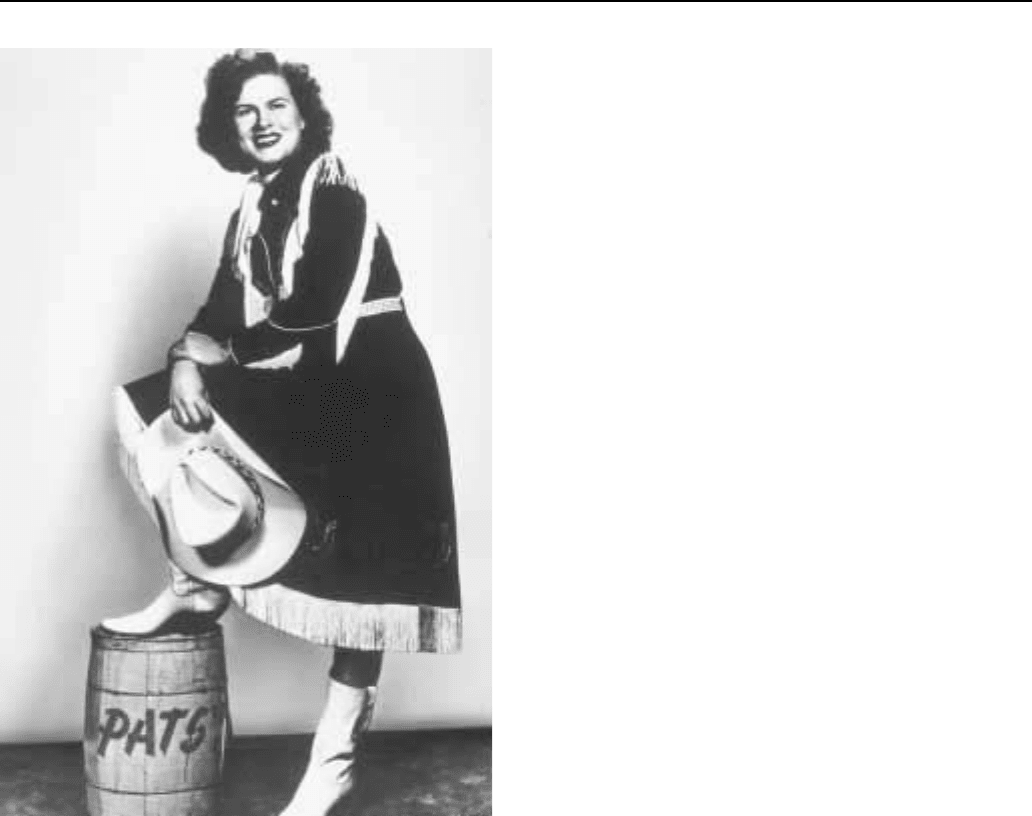
CLINEENCYCLOPEDIA OF POPULAR CULTURE
531
Patsy Cline
band leader Bill Peer hired Cline to be the lead singer of his act, the
Melody Boys and Girls, in 1952. Peer became her manager, and
proposed that she use the stage name Patsy; shortly thereafter, she met
and married Gerald Cline.
In 1954, Cline signed a recording contract with Four Star
Records that would prove to be a major stumbling block in her career.
The contract paid her only small royalties and included a stipulation
that her material had to be approved by the label. As a result, almost
all of Cline’s pre-1960 recordings were songs chosen by the label’s
owner, Bill McCall, and published by Four Star, enabling the label to
profit from the publishing royalties. Four Star made a deal that
allowed major label Decca Records to lease Cline’s music, giving her
the opportunity to work with top Nashville session musicians and a
gifted producer, Owen Bradley. Although Cline’s talent was apparent
to those who heard her sing, the recordings she made in the mid-1950s
were largely ignored. A fan of pop singer Kay Starr, she was capable
of styles other than country, and Bradley quickly recognized this.
Though Cline preferred country material, the songs from her early
recordings ran the gamut.
At the end of 1956, at McCall’s insistence, Cline recorded
‘‘Walkin’ After Midnight,’’ a tune she reportedly described as
‘‘nothin’ but a little ol’ pop song,’’ according to biographer Ellis
Nassour. Before the record’s release she made her national television
debut on Arthur Godfrey’s Talent Scouts in January of 1957. Cline
favored the western outfits commonly worn by country singers of that
era, but for this performance she was told to wear a cocktail dress.
Godfrey’s staff also encouraged her to abandon country music and
move to New York. She was not persuaded, however, and continued
to promote the record with appearances on the Opry and a rock ’n’ roll
show in New York hosted by Alan Freed. The song became a Top Ten
hit on the country charts and went to number 17 on the pop charts.
That same year, Patsy and Gerald Cline were divorced, and in
the fall she married Charlie Dick. Over the next two years, she
released several singles and gave birth to her first child. During the
summer of 1959, she hired Ramsey ‘‘Randy’’ Hughes as her manag-
er. As the result of Cline’s failure to record any major hits after
‘‘Walkin’ After Midnight,’’ McCall chose not to renew her Four Star
contract. At the beginning of 1960, she began performing regularly on
the Opry, fulfilling a childhood dream. Decca signed her later that
year, and Bradley found the perfect song for her first session. In 1961,
‘‘I Fall to Pieces,’’ featuring the background vocals of the Jordanaires,
became her first number one country hit, reaching number 12 on the
pop charts. The success of this record confirmed Bradley’s belief that
Cline could capture a much larger audience by focusing her efforts on
pop ballads. Later hits such as ‘‘Crazy’’ and ‘‘She’s Got You’’
established her as a torch singer, and Bradley began using string
accompaniments on a semi-regular basis. These lush arrangements
typified the Nashville sound, and Bradley became a proponent for this
new style. By late 1962, she was headlining a month long engagement
in Las Vegas, wearing evening gowns. On March 5, 1963, a plane
crash outside Camden, Tennessee, killed Cline, along with Cowboy
Copas, Hawkshaw Hawkins, and Randy Hughes.
Throughout her career, Cline had a reputation for being outspo-
ken and opinionated. Those who knew her described her as a
‘‘brassy’’ woman who drank and cursed along with her male counter-
parts. She was also noted for being kindhearted and generous,
particularly toward other female country artists struggling for suc-
cess. The male-dominated recording industry of the 1950s was
unaccustomed to self-confident women, and Cline’s headstrong tem-
perament led to arguments with Bradley over her material. The
contradictions between her professional image and her personal
background reflect the conflicting forces that were shaping country
music in the early 1960s. Despite changes in country and pop styles,
the legendary voice of Patsy Cline remains timeless. She gained a new
following in 1985, when Jessica Lange starred in the film biography
Sweet Dreams. Over three decades after her death her recordings
continued to appear on the charts.
—Anna Hunt Graves
F
URTHER READING:
Jones, Margaret. Patsy: The Life and Times of Patsy Cline. New York,
HarperCollins, 1994.
Kingsbury, Paul. The Patsy Cline Collection. Nashville, MCA Rec-
ords/Country Music Foundation, 1991.
Lewis, George H., editor. All That Glitters: Country Music in
America. Bowling Green, Bowling Green State University Popu-
lar Press, 1993.

CLINTON ENCYCLOPEDIA OF POPULAR CULTURE
532
Malone, Bill C. Country Music, U.S.A. Austin, University of Texas
Press, 1985.
Nassour, Ellis. Patsy Cline. New York, Dorchester, 1985.
Clinton, George (1940—)
George Clinton was a doo-wop singer until he discovered acid
rock and protest music in the late 1960s, a combination to which he
added cosmological rants and booming bass lines to create a new style
of socially conscious, Afrocentric funk. His bands Parliament and
Funkadelic reached black and white audiences alike in the 1970s with
their psychedelic live shows and infectious, tongue-in-cheek concept
albums (Mothership Connection, 1976; One Nation Under a Groove,
1978). Clinton disappeared amid drug and financial entanglements,
but reemerged in 1983 as rappers and hip-hop artists began sampling
his music and borrowing his aesthetics. In response, he formed the P-
Funk All-Stars (a permutation of his many splinter groups) to support
new albums and reissues of classic works, reinforcing the vitality of
his universal—yet pointedly black—music.
—Tony Brewer
F
URTHER READING:
Marsh, David. George Clinton and P-Funk: An Oral History (For the
Record). New York, Avon, 1998.
Vincent, Rickey, and George Clinton. Funk: The Music, the People,
and the Rhythm of the One. New York, St. Martin’s Press, 1996.
A Clockwork Orange
A Clockwork Orange is one of the finest sociological and science
fiction films ever made. With its highly stylized and often comic
violence, its over-the-top set decoration, and its unlikeable protago-
nist, the film has exerted a wide-ranging influence on popular culture.
Opening in New York on December 20, 1971, to mostly ecstatic
praise, A Clockwork Orange immediately revolutionized the science
fiction film by opening the way for more elaborate dystopian narra-
tives and intelligent cinematic analyses of social dilemmas.
Based on Anthony Burgess’s 1966 novel of the same name, A
Clockwork Orange tells the story of Alex (Malcolm McDowell), a
brilliant young thug whose thirst for violence, rape, and aggression
lands him in prison. To free himself from prison, he must submit to a
perverse behavior modification technique that strips him of his free
will. Director Stanley Kubrick’s portrayal of conditioned-reflex therapy,
behavioral psychology, and systematized and bureaucratic cruelty
placed audiences in the uncomfortable position of feeling sympathy
for a brutal and seemingly immoral character.
Kubrick counters Alex’s brutality with that of the State police.
Alex’s earlier crimes pale in comparison to his torture by his old gang
buddies-cum-cops. His medical rehabilitation by the Ludovico tech-
nique, which includes viewing endless scenes of rape, murder,
lynching, and violence while listening to the music of Alex’s beloved
‘‘Ludwig Van’’ (Beethoven), seems more egregious than any injury
Alex inflicted. These juxtapositions force the audience to make an
uncomfortable moral choice between the virtue of free will with all its
perversions and the appeal of legislative/social control with its
tendency toward totalitarianism. Though Kubrick had touched on
these themes in his earlier films—including, Paths of Glory (1957),
Dr. Strangelove, Or, How I Stopped Worrying and Learned to
Love the Bomb (1964), and even Spartacus (1960) and 2001: A
Space Odyssey (1968)—none illustrated his message as well as A
Clockwork Orange.
Kubrick accentuates the moral choices in the film with brilliant
cinematic couplings. He sets a murder/rape scene to ‘‘Singin in the
Rain,’’ a song celebrating the optimism and bliss of life. He pairs
Alex’s desire for pain and violence with his love and devotion to
Beethoven, which is highlighted by Kubrick’s use of both classical
and electronic music throughout the film. His elaborate set designs
contrast the blue- and white-collar worlds with the State. The Cat
Lady’s enormous penis sculpture and the submissive, objectified
naked female sculptures at the Korova Milkbar are strikingly different
from the ‘‘flatblock’’ State architecture of the prison and Alex’s
parents’ home, which is an eerie twin of the Housing Authority
projects littering the inner cities of the world. Kubrick also highlights
the differences between the flatness of the ‘‘official’’ language and
the vitality of the teenage argot, Nasdat: a home is called ‘‘HOME,’’
but in Nasdat ‘‘horrorshow’’ means awe and pleasure and ‘‘in-out-in-
out’’ is a evocative term for sex.
These cinematic exercises are reflected by innovations in tech-
nique specific to Kubrick’s filmmaking. His hallmarks include chill-
ing natural lighting, extreme close-ups, interminable tracking or
panning shots, jump-cut sequencing, extreme wide-angle lenses, and
low-angle and slow motion shots. Kubrick’s technical precision is
matched only by his deeply intellectual consideration of timeless
issues of freedom, pleasure, law, and punishment. Though New York
Times film critic Pauline Kael criticized the lack of ‘‘motivating
emotion’’ in the protagonist and comic violence, many film directors
found much worth borrowing from it. Films using similar techniques
include THX-118, Westworld, and A Boy and His Dog. Reflections of
the movie’s highly complex and ambiguous antihero can be seen in
films by Martin Scorsese, David Lynch, and Quentin Tarantino. In
addition, the midnight movie crowd adopted the film’s unique lan-
guage called Nasdat and would shout along with the movie on college
campuses across the country. Kubrick’s daring vision for A Clock-
work Orange was rewarded with the New York Film Critics Award
for Best Picture as well as four Academy Award nominations. The
film placed its director in the company of the most influential and
creative artists of the twentieth century.
—Scott Thill
F
URTHER READING:
Kagan, Norman. The Cinema of Stanley Kubrick, New Expanded
Edition. New York, Continuum Publishers, 1995.
Nelson, Thomas Allen. Kubrick: Inside a Film Artist’s Maze. Bloom-
ington, Indiana University Press, 1982.
Walker, Alexander. Stanley Kubrick Directs, Expanded Edition. New
York, Harcourt, Brace and Jovanovich, 1972.
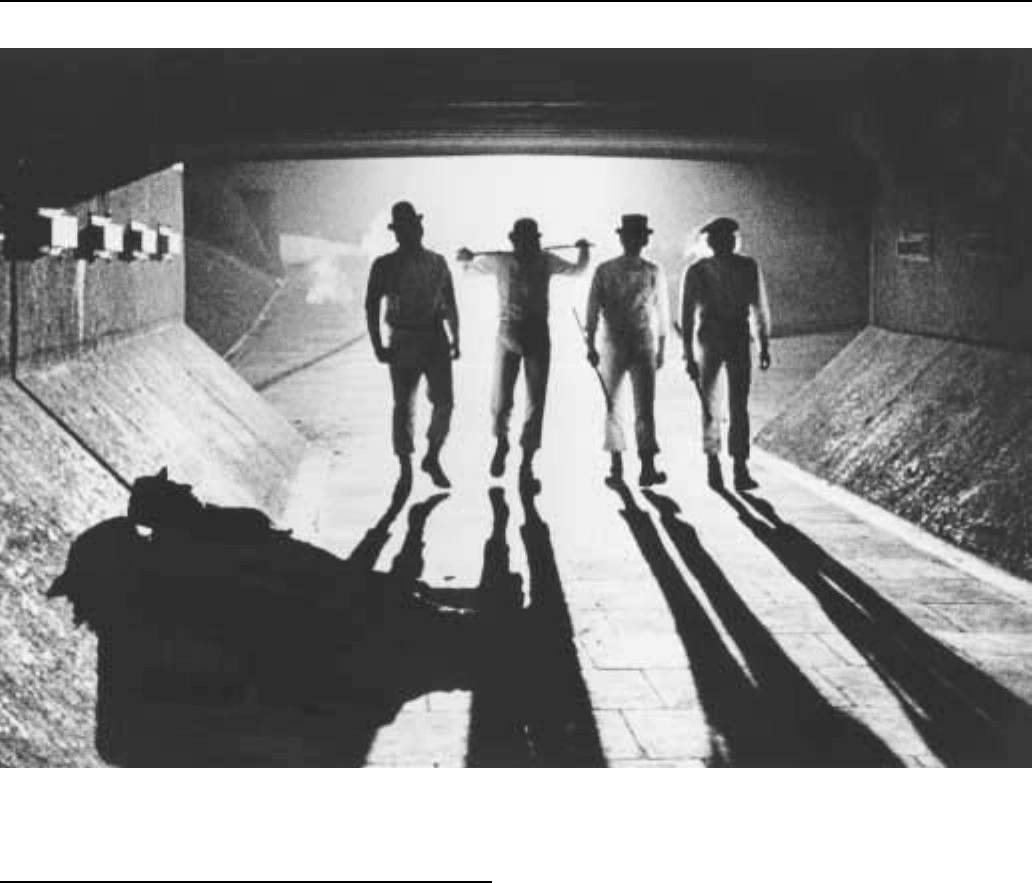
CLOONEYENCYCLOPEDIA OF POPULAR CULTURE
533
A scene from the film A Clockwork Orange.
Clooney, Rosemary (1928—)
No one more epitomized female vocalists of the 1950s, a time
when America was hooked on novelty songs, than Rosemary Clooney.
With her strong, belting, melodious style and novelty hits ‘‘Come on
a My House,’’ ‘‘Mambo Italiano,’’ and ‘‘This Old House,’’ Rose-
mary Clooney swiftly achieved stardom in the early 1950s. She also
joined the ranks of the era’s top female vocalists, including such stars
as Jo Stafford, Peggy Lee, and Patty Page. Her career transcended the
concert circuit, including television and film appearances; she proved
a perfect match for the rapidly developing television industry. During
the later years of Clooney’s career, with a more smoky, rich voice,
critics compared her with top performers such as Ella Fitzgerald, Mel
Torme, and Frank Sinatra.
Born in Maysville, Kentucky, on May 28, 1928, Rosemary and
her sister Betty often performed at political rallies for their paternal
grandfather. When Rosemary was 13, the family moved to Cincin-
nati, Ohio. During her high-school years Rosemary and sister Betty
performed with a local band until, at the age of 16, the two were hired
by Cincinnati radio station WLW to perform on a nightly music
program. Performing under the name ‘‘The Clooney Sisters,’’ the duo
continued to work at the station for two years. By 1945, however, the
Clooney Sisters had joined the Tony Pastor band and were performing
one-night stands across the country in theaters, hotel ballrooms, and at
high school proms. Due to her better mid-range voice, Rosemary sang
solos for the sister team. The Clooney Sisters performed with Tony
Pastor for two years until, suddenly, during a performance in Elkhart,
Indiana in 1949, Betty quit during the intermission. Soon after,
Rosemary embarked on a solo career.
Following her departure from the Tony Pastor Band, Clooney
signed a modest recording contract with Columbia Records. She had a
modicum of success at Columbia with the children’s songs ‘‘Me and
My Teddy Bear’’ and ‘‘Little Johnny Chickadee.’’ Mixed in with
recording dates were appearances at night clubs, on radio stations, and
on television. It was, however, her performance on Arthur Godfrey’s
Talent Scouts in 1950 that led to her run on Songs for Sale, premiering
July 7, 1950. Simulcast on radio and television, the program showcased
the talents of aspiring songwriters, with Rosemary Clooney and Tony
Bennett as vocalists for the program. It was also during this period in
her life that, under the influence of Columbia’s artist and repertoire
man Mitch Miller, Rosemary Clooney produced her first big hit
‘‘Come on a My House,’’ which sold over a million copies. This was
followed by pop hits ‘‘Botcha Me’’ and ‘‘Suzy Snowflake.’’ Count-
less other chart busters followed including her ballad ‘‘Tenderly,’’
‘‘This Old House,’’ and ‘‘Hey There.’’
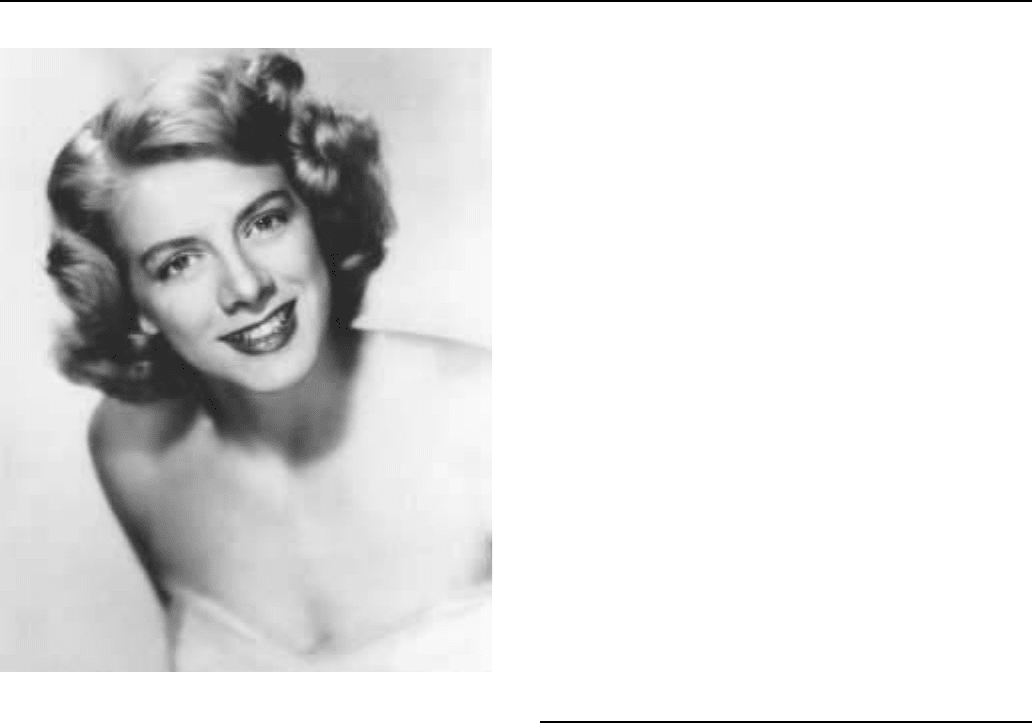
CLOSE ENCOUNTERS OF THE THIRD KIND ENCYCLOPEDIA OF POPULAR CULTURE
534
Rosemary Clooney
Bing Crosby, a big fan of Clooney’s music, recommended her
for a screen test at Paramount Studios. Cast as a New York vaudevillian
who attempts to hide an illegal alien, she made her premiere in the
1953 film The Stars Are Singing. Later that year she appeared with
Bob Hope in the comedy Here Come the Girls, but her most notable
achievement in motion pictures occurred in 1954 when she appeared
with Bing Crosby in the hit film White Christmas. During this period
she also began a CBS radio program called The Rosemary Clooney
Show, which lasted for one season, and made the television variety
show circuit as a guest on the Ed Sullivan Show, Perry Como Show,
and Steve Allen Show.
In 1957, the Music Corporation of America (MCA) contracted
Clooney to produce the syndicated half-hour television program The
Rosemary Clooney Show. The program was well received by the
general public and critics alike, and included notable musical talents
the Nelson Riddle Orchestra and the Hi-Los. Seemingly never with-
out energy or creativity, she then began a NBC variety series titled
The Lux Show Starring Rosemary Clooney in the fall of 1957.
Because of personal conflicts between her husband, Jose Ferrer, and
Mitch Miller, her career was at an end with Columbia Records and she
joined the RCA label.
During the 1960s Clooney’s life was in turmoil. Her marriage to
Jose Ferrer was on-again-off-again, finally ending in divorce. Clooney
was left with five children to rear. She appeared on a number of
variety shows and specials on network television, and also performed
on the cabaret circuit. By 1968, Clooney was heavily dependent on
drugs and had just ended a two-year relationship with a drummer.
After working with the Robert Kennedy presidential campaign in
1968, she was devastated by his assassination and suffered a severe
nervous breakdown during a performance at Harold’s Club in Reno
Nevada. She underwent extensive psychotherapy for eight years
following the breakdown. She chronicled her psychiatric problems in
her autobiography This for Remembrance, which was dramatized on
television as Escape From Madness.
During the 1980s, a much happier and heavier Rosemary Clooney
emerged with an assured straightforward belting style all her own.
She performed on the Las Vegas nightclub circuit, toured with
theatrical revues, appeared on network television programs, and
assisted in the television production of her life story Rosie: The
Rosemary Clooney Story, providing the soundtrack singing voices.
An emblematic figure, at the close of the twentieth century she
finds herself revisiting many of her classics from the 1940s and 1950s
at concerts and on recordings. Like the changing times in which she
lived, Clooney proved that a woman could have a successful career, a
family, and survive many setbacks. Her work in the music industry,
like many post-World War II female singers, helped pave the way for
future generations of women artists.
—Michael A. Lutes
F
URTHER READING:
Clooney, Rosemary. This for Remembrance: The Autobiography of
Rosemary Clooney, an Irish-American Singer. New York, Play-
boy Press, 1977.
Close Encounters of the Third Kind
With its elaborate, unprecedented use of special effects and
novel portrayal of extraterrestrials, Close Encounters of the Third
Kind opened to popular acclaim in November 1977, eventually
earning $240 million in worldwide release and significantly contrib-
uting to director Steven Spielberg’s status as the most commercially
profitable filmmaker in the new Hollywood. Close Encounters de-
picts an escalation in the number of UFO sightings worldwide and
climaxes in the first ‘‘diplomatic’’ contact between mankind and
extraterrestrials at a remote military/scientific base in the Wyoming
wilderness. In stark contrast to numerous earlier cinematic portrayals
of alien visitors as hostile fiends intent on world domination, Spielberg’s
utopian film presented the extraterrestrials as childishly mischievous
but benign: wondrous new friends from the stars. Spielberg would
return to some of Close Encounters’s themes again in 1982’s E.T.:
The Extra-Terrestrial, another worldwide blockbuster and for a time
the most lucrative motion picture ever.
Two parallel stories are developed in Close Encounters. The first
focuses on a scientific team, led by a Frenchman named Lacombe
(famous French film director Francois Truffaut), that tracks global
UFO activity. The second centers around a midwestern everyman
named Roy Neary (Richard Dreyfuss), who is destined to be humani-
ty’s emissary to the stars. The film opens in the windswept Mexican
desert, where the airplanes (minus their pilots) of a long-lost military
training flight have mysteriously appeared. Lacombe’s team discov-
ers that the antique airplanes are in perfect working order. Meanwhile,
the skies over the American Midwest are abuzz with strange objects
and lights. A power company lineman, Neary sees a group of UFOs
flying down lonely back roads near Muncie, Indiana, and becomes
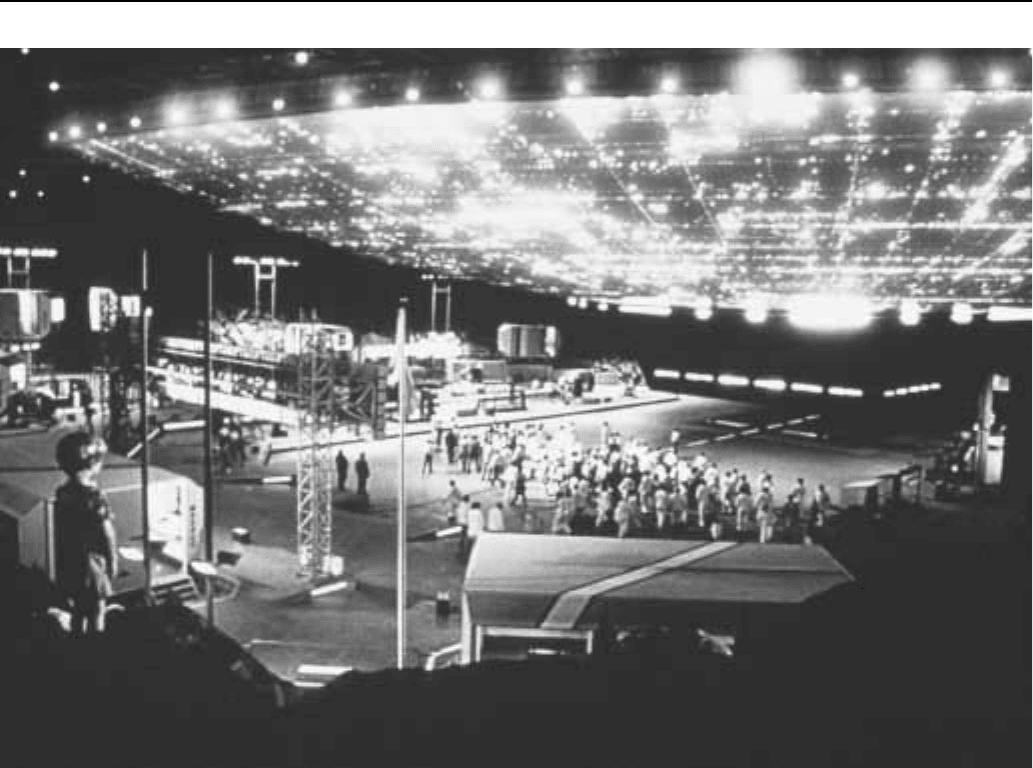
CLOSE ENCOUNTERS OF THE THIRD KINDENCYCLOPEDIA OF POPULAR CULTURE
535
A UFO makes contact, in a scene from the film Close Encounters of the Third Kind.
obsessed with encountering the aliens again. Unhappy with the
demands of adult married life, Neary shares his obsession with a local
woman named Jillian (Melinda Dillon), who is in search of her young
son, Barry, following his abduction by a UFO.
As the international scientific team moves closer to setting up a
secret landing site at the base of Devil’s Tower in Wyoming to beckon
the visitors, Neary becomes more fixated on a mental image—that of
an oddly shaped mountain—implanted in his head during his UFO
encounter. Eventually, his tortured attempts to re-create the image in
reality lead him to build a mountain of mud and garbage in his living
room and thus drive his family away for good. When he sees Devil’s
Tower on television during coverage of a supposed nerve-gas spill in
the area (actually a hoax concocted by the military to give the UFO
team the required secrecy for first contact), Neary finally knows
where he has to go and takes Jillian with him. After a hazardous cross-
country trek, Neary and Jillian reach the secret landing site and
witness mankind’s first attempts to communicate with the swarms of
beautifully illuminated extraterrestrial craft through a five-note musi-
cal tone keyed to a light board. A gigantic mothership—a literal city
of light in the night sky—arrives to release numerous abductees,
including Jillian’s son. Different types of aliens also disembark and
mingle with the delighted scientists. Meanwhile, Neary, with Lacombe’s
blessing, suits up for a long journey aboard the mothership. As soon as
the ecstatic Neary and his alien escort disappear inside it, the
mothership soars majestically back into the night.
The film originated in Spielberg’s memories of his formative
years in Arizona, where as a teenager he had made an 8mm sound film
on the subject of UFOs entitled Firelight. Throughout the beginning
of his career as a professional filmmaker, Spielberg intended to
remake his amateur film and call it Watch the Skies. During produc-
tion of Jaws (1975), Spielberg often entertained his crew with tales
about UFOs and his plans to make a film about them; with the critical
and financial success of Jaws, Spielberg had the clout to do so. He and
other writers, including Paul Schrader, worked on various screenplay
drafts, although it was Spielberg who received sole credit. He also re-
titled the film Close Encounters of the Third Kind—a puzzling title to
all except UFO buffs, who would recognize the phrase as UFO expert
and Northwestern University professor Dr. J. Allen Hynek’s termi-
nology for physical contact with extraterrestrials.
Columbia Studios agreed to finance the project at an initial cost
of $16 million. Pre-production scouting settled on the Devil’s Tower
location as a suitably mysterious backdrop for the film’s climax. The
film quickly went over budget, finally costing approximately $20
million because of a host of factors, including the logistical demands
of location shooting in Wyoming and India (for a brief sequence
involving thousands of extras pointing to the sky); the lengthy

CLOSET ENCYCLOPEDIA OF POPULAR CULTURE
536
climactic scene, which required an enormous and problem-plagued
set in a hangar in Alabama; and the special effects, supervised by
Douglas Trumbull, which involved months of planning and con-
sumed millions of extra dollars. Spielberg’s fanatic attention to detail
and demands for secrecy on the set added to the studio headaches and
delayed the film’s release date. Producer Julia Phillips did not
approve of some key figures associated with the production, includ-
ing Truffaut, and was eventually fired by the studio head, David
Begelman. Columbia itself was suffering from major financial prob-
lems and scandals, and a negative early review of the film did nothing
to improve frazzled nerves in the production offices. However, once
the film opened, the reviews were much more positive, and the film
began to make enough money to be considered another huge success
for Spielberg.
There are several different versions of the film in existence. A
few years after its initial run, Spielberg returned to the film, re-titling
it Close Encounters of the Third Kind: The Special Edition. At a cost
of $2 million and a seven-week shoot, he filmed new scenes, the most
notable of which is a rather disappointing look inside the mothership,
and removed some of the lengthy middle portion of the film detailing
Neary’s breakdown. He also added a brief rendition of ‘‘When You
Wish upon a Star’’ to the musical score accompanying the mothership’s
ascent to the heavens. The new version, actually a few minutes shorter
than the original, was released in 1980. A later television version
combined elements of both films. The special edition was the version
most widely available on videostore shelves until a 1998 video
release, subtitled The Collector’s Edition, a re-edited mix of the
original version plus five short sequences from the 1980 special edition.
—Philip L. Simpson
F
URTHER READING:
Balaban, Bob. Close Encounters of the Third Kind Diary. New York,
Paradise Press, 1978.
Brode, Douglas. The Films of Steven Spielberg. New York, Citadel
Press, 1995.
Mott, Donald R., and Cheryl McAllister Saunders. Steven Spielberg.
Boston, Twayne, 1986.
Perry, George. Steven Spielberg Close Up: The Making of His
Movies. New York, Thunder’s Mouth Press, 1998.
Taylor, Philip M. Steven Spielberg: The Man, His Movies, and Their
Meaning. New York, Continuum, 1992.
The Closet
Since the 1950s, ‘‘coming out of the closet’’ has been the
commonly accepted expression for a gay or lesbian person revealing
their sexual orientation since the 1950s. Though many advances in
gay rights and gay pride have been realized since then, coming out of
the closet remained a major milestone in any gay person’s life into the
late 1990s.
The expression ‘‘coming out’’ originated in the early twentieth
century when stylish drag ‘‘debutante’’ balls were popular society
events. Especially in African American communities, the drag queen
in-the-know aspired to be presented at these balls, just as young
heterosexual women ‘‘came out’’ to society at their debutante balls. It
was only later, in the 1950s atmosphere of hiding the abnormal, that
the connotation came to be that of coming out of a dark closet.
Perhaps playing on the expression ‘‘skeleton in the closet,’’ meaning
a guilty secret, homosexuals themselves were the sinister skeletons
lurking behind the closet door. In the decades since gay liberation
began, the expression has slipped into popular usage, and ‘‘coming
out of the closet’’ is used in a lighthearted way for any admission of a
slightly guilty secret.
The closet remains a metaphor for the shame and oppression that
forces many gays to hide their identities. ‘‘Closeted’’ or ‘‘closet-y’’
are also used as adjectives, sometimes derisively, to describe gays
who pretend to be heterosexual. ‘‘Closet case’’ refers to someone
suspected of being gay but unaware of it or hiding it. ‘‘Coming out’’ is
used among gays to signify the first time they acted on their sexuality
(as in, ‘‘I came out when I was fifteen with my best friend’’) as well as
the traditional means of announcing their sexuality ‘‘to the world.’’
‘‘Outing’’ has gained usage as a verb meaning the exposure of
someone else’s gayness, particularly someone who is well-known
and closeted.
Because of the widespread assumption of heterosexuality in
American society, coming out of the closet is a lifelong endeavor for
gays. Gay men and lesbians must decide whether to come out to
friends, to immediate family, to extended family, at work, and so on,
and each decision involves a new set of worries and consequences.
Even relatively well-known gays must continually assert their identi-
ty in new situations or remain in the closet by default.
Gay activists have long touted the importance of coming out of
the closet, insisting that much of the oppression gays experience
would be diffused if their true numbers were known. In this spirit, the
first National Coming Out Day was declared on October 11, 1988, the
first anniversary of the second gay and lesbian March on Washington,
D.C. The idea behind National Coming Out Day is to encourage gays
to come out of the closet to at least one person on that day. Some
organizations have even distributed printed cards for gays to give to
bank tellers and store clerks announcing that they have just served a
gay client.
Though in the days of gay sitcom characters, noted gays on
magazine covers, and many openly gay organizations, the closet may
seem like a quaint remnant of a former time. Yet gays who do not live
in urban areas, do not have protected jobs, or do not have understand-
ing families still fear the repercussions of coming out. It may be true
that tolerance will come only when the public realizes how many gay
people there are, even among their friends, family, and most respected
public figures. However, to gays who have been harassed or beaten,
or gays who have lost or had to fight court battles to keep their
children, gays who have lost their jobs, coming out of the closet may
seem a luxury they can ill afford.
—Tina Gianoulis
F
URTHER READING:
Bono, Chastity, and Billie Fitzpatrick. Family Outing. New York,
Little, Brown and Company, 1998.
Day, Nancy E., and Patricia Schoenrade, ‘‘Staying in the Closet
Versus Coming Out: Relationships between Communication about
Sexual Orientation and Work Attitudes.’’ Personnel Psychology.
Vol. 50, No. 1, Spring 1997, 147.
Harbeck, Karen M., editor. Coming Out of the Classroom Closet: Gay
and Lesbian Students, Teachers, and Curricula. New York,
Haworth Press, 1992.

CNNENCYCLOPEDIA OF POPULAR CULTURE
537
CNN
CNN (Cable News Network) was rated ‘‘the most believable’’
of television news sources in a 1990 Times Mirror poll. By the end of
the twentieth century it had established itself as the leading news-
gathering organization, not only in the United States, but in the world.
Although in its early days CNN was a little-respected, self-described
‘‘rough around the edges’’ long-shot, by the 1990s other television
news departments feared its domination so much that NBC and Fox
decided to compete directly, on cable. Early CNN critics doubted that
television could host a 24 hour news channel, but executives soon
agreed that there was enough of a market for a number of them. By the
end of the twentieth century, CNN’s growth into a family of net-
works—CNN Headline News, CNN International, CNN en Espanõl,
CNNfn (financial news), CNN-SI (sports), CNN Airport Network,
CNN Radio, and CNN Interactive (Internet)—has positioned it as the
first in a now long line of network news shows which feed America’s
hunger for critical analysis of daily events.
When Peter Arnett appeared live on CNN from Bagdad while the
city was under attack by American bombers, the network’s reputation
as the source of first resort for major international news was cement-
ed. Founder Ted Turner had called it ‘‘the world’s most important
network’’ from the beginning, but now many others commented on
The CNN newsroom.
the ‘‘CNN effect’’; how all participants in the war monitored the
network for primary information and often seemed to design military
movements and press briefings with particular concern for how they
would appear on CNN. World leaders now routinely mention the
Cable News Network and its programming. Its influence is such that it
is referred to as ‘‘the sixteenth member of the U.N. Security Coun-
cil.’’ At the end of 1980, after half a year of broadcasting, CNN
reached 4.3 million subscribers; by 1998 it claimed 184 million
households worldwide.
Ted Turner’s 1979 announcement about forming a 24 hour cable
news network elicited scoffs and scorn from the mainstream media.
The idea that such an enterprise could be profitable, let alone become
a dominant world-wide news source, seemed ridiculous. Several
major news organizations had looked into forming just such a service,
but had determined that it would be far too expensive. The three
networks each spent over one hundred million dollars a year on their
news divisions, the result of which was the material for a half-hour
broadcast each evening. Turner proposed running 24-hour-a-day
programming on a budget of less than half that amount.
The America’s cup, WTCG, and the Braves had already made
Ted Turner well-known. He had won the Cup in 1977 and was
featured on the cover of Sports Illustrated. After inheriting a modest
billboard business in 1963, Turner built a media company by buying
struggling UHF stations in Atlanta and Charlotte, North Carolina. He
surprised the established media in 1972 when his channel 17, WTCG
(later WTBS), beat out WSB, the largest television station in the
south, for the rights to broadcast Atlanta Braves baseball games. In
1976 Turner bought the Braves, the Hawks of the NBA (National
Basketball Association), and the Chiefs of professional soccer, large-
ly to assure that they would remain in Atlanta where he could continue
to broadcast their games. WTCG’s signal was made available via
satellite in December 1976. During the 1970s, cable television was
still in its infancy—Home Box Office, one of the first cable channels,
was launched in 1975—with only about 14 percent of American
households subscribed to cable.
Turner recruited a team of committed news people and for the
most part left the planning of the new network to them. They were
excited by his vision of a channel dedicated entirely to reporting the
news and decided that the emphasis should be on live coverage.
Operating out of a former country club, CNN went on the air on June
1, 1980. It started out with a staff of 300 and seven bureaus: Atlanta,
New York, Chicago, Los Angeles, Detroit, London, and Rome.
Disparagingly referred to as the ‘‘Chicken Noodle Network,’’ the
disparity between its budget and those of the broadcast network news
programs sometimes showed in production quality in its first few
years. Gaffes and mixed signals seemed endemic at times. More
often, CNN claimed, the ‘‘raggedness’’ was unavoidable with un-
compromising, unfiltered breaking news coverage to which the
network was dedicated. Ignoring the naysayers, producers pushed for
close monitoring of potentially developing situations so that when
something happened, they could cut to it immediately. Producer Ted
Kavanau became known for calling out, ‘‘take it!’’ when he wanted a
switch made at once.
It was not until 1985, as it worked to increase viewership and
fend off rivals, that Cable News Network was profitable. In 1981,
Westinghouse, which owned major cable-provider Group W, an-
nounced a partnership with ABC News to take on CNN; they named
the venture SNC (Satellite NewsChannel). In direct response, CNN
launched Headline News on December 31, 1981, almost six months
before SNC was introduced on June 21, 1982. Still, the direct

COBB ENCYCLOPEDIA OF POPULAR CULTURE
538
competition proved to be the greatest challenge to CNN’s survival.
Ted Turner spent millions of dollars competing with SNC, and finally
defeated the network by buying it for 25 million dollars. It ceased
programming on October 27, 1983.
For the 1980 major-party political conventions, CNN did not
even have floor credentials, but by the 1992 conventions the tradition-
al broadcast networks cited CNN’s in-depth, gavel-to-gavel coverage
as a primary reason for their limited coverage. Originally CNN had to
fight for equal access to the White House, but by October 1987 the
White House invited anchors from ‘‘all four networks’’ for a ‘‘chat.’’
Respect was acquired gradually. CNN gave the first American report
of the Pope’s shooting in May 1981 and extensive coverage to the
Falkland War in April 1982. The network was providing the only live
coverage of the Space Shuttle Challenger launch on January 28, 1986,
when it tragically exploded 96 seconds after take-off.
Despite great logistical problems and restrictions by govern-
ments, 1989 provided CNN with many riveting images: the Tiananmen
Square massacre in May, the failed Russian coup in August (with
Boris Yeltsin rallying the throngs from atop a tank), the November
fall of the Berlin Wall, and the invasion of Panama in December.
These milestones bolstered the network’s reputation little by little, but
it was the Gulf War that elevated CNN’s status to that of undisputed
authority for major, breaking news. President George Bush told
diplomats, ‘‘I learn more from CNN than I do from the CIA.’’
Time-Warner bought CNN from Ted Turner in 1996 for three
billion dollars. Turner also stayed on as an executive vice president.
CNN’s credibility, however, was damaged in 1998 after an investiga-
tive report on the new program Newsstand, alleging that American
forces used nerve gas in Laos in 1970. Attacks on the credibility of the
story led the network to retract the story and fire the producers of
the piece.
Despite CNN’s undeniable influence, all of the networks again
considered starting their own cable news channels in the early 1990s;
NBC and Fox went ahead with theirs. Rupert Murdoch, media
magnate owner of Fox, said that he wanted to counter what he called
CNN’s ‘‘liberal bias.’’ Ted Turner cast CNN as an agent of global
understanding and peace. From the dedicatory ceremony in front of
the original CNN headquarters, where a United Nations flag flew
alongside those of the United States and the State of Georgia, he has
insisted that CNN is a world network, not American. The word
‘‘international’’ is preferred to ‘‘foreign,’’ correspondents from all
over the world are employed, and CNN’s tolerant reporting on many
totalitarian governments has provoked withering attacks from some
American conservatives. Turner also saw the network as a key
element in the ‘‘Third Wave’’ of futurist Alvin Toffler. Toffler
predicts that the information age will lead to a global age. Marshal
McLuhan also influenced Turner; writer Joshua Hammer writes, ‘‘If
Marshal McLuhan’s global village exists, its capital is the CNN
headquarters in Atlanta.’’ CNN International was launched in 1985
and in 1987 CNN introduced a new show called World Report, a two
hour program featuring unedited three minute segments from local
television journalists world-wide.
CNN claims to be different from older network television news
because it is an all-news network and it is on cable. Its cable home
means that CNN receives approximately half of its income from fees,
making it is less dependent on ratings than free broadcast channels
are. Therefore, CNN officials argue, the network can cover news
more objectively, with less concern for what may titillate viewers. Its
news-only format means that it feels no influence from larger enter-
tainment division. In the 1990s CNN was watched by an average half
million households in prime time, while the big three broadcast
evening news programs were seen by around 25 million viewers.
CNN executives routinely refer to the large broadcast networks as
‘‘the entertainment networks.’’ Largely due to its commitment to
world-wide, unfiltered coverage, as Time magazine wrote on January
6, 1992, ‘‘It has become the common frame of reference for the
world’s power elite.’’ A 1992 poll found CNN the fourth most
respected brand name in the United States, surpassed only by Merce-
des-Benz, Kodak, and Disney. Despite its relatively low ratings
(except during moments of crisis), CNN can legitimately call itself
the world’s premier television news service, essentially the network
of record, equivalent to the New York Times in print journalism.
—Paul Gaffney
F
URTHER READING:
Diamond, Edwin. The Media Show: The Changing Face of the News,
1985-1990. Cambridge, MIT Press, 1991.
Flournoy, Don M., and Robert K. Stewart. CNN: Making News in the
Global Market. Luton, United Kingdom, University of Luton
Press, 1997.
Kerbel, Matthew Robert. Edited for Television: CNN, ABC, and
American Presidential Elections. 2nd edition. Boulder, Colorado,
Westview Press, 1998.
Whittemore, Hank. CNN: The Inside Story. Boston, Little, Brown and
Co., 1990.
Cobb, Ty (1886-1961)
The most fear-inspiring presence in baseball history, Ty Cobb
was unmatched as a performer during his 24-year career in the major
leagues. Cobb set statistical marks that, on the eve of the twenty first
century, no major-leaguer has equaled. His .367 lifetime batting
average is 23 points higher than Ted Williams’ second best mark.
Cobb’s 2,244 runs scored put him well ahead of Babe Ruth. His feat of
leading his league in batting average 12 times easily tops Honus
Wagner’s eight, and his 37 steals of home plate may never be broken.
But Cobb is equally well known for his violent style of play and his
ferocious temper. Lou Gehrig, angered one day when Cobb brutally
spiked a Yankee pitcher on a play at first base, complained that
‘‘Cobb is about as welcome to American League parks as a rattle-
snake.’’ He was so hated by his teammates that for much of his career
he carried a gun in a shoulder strap just in case a group of them jumped
him. Cobb’s career began at a time when baseball’s rules were still in
flux, and spanned the ‘‘dead-ball’’ and ‘‘rabbit-ball’’ eras of the first
two decades of the twentieth century.
Tyrus Raymond Cobb was born on December 18, 1886 in an
area of Georgia known as the Narrows, near Banks County. His
mother, Amanda Chitwood, had been a child bride of only 12 years of
age in 1883 when she married William Herschel Cobb, then a 20-
year-old schoolteacher. Despite these modest beginnings in poor rural
Georgia, Ty Cobb was the latest in a long roster of prominent
ancestors. The Cobb tribe dated back to Joseph Cobb, who emigrated
from England in 1611 and who eventually became a Virginia tobacco
tycoon. Thomas Willis Cobb was a colonel in the Revolutionary War
and an aide to General Washington. Thomas Reade Rootes Cobb died
as a Confederate brigadier general at Fredericksburg and Howell
